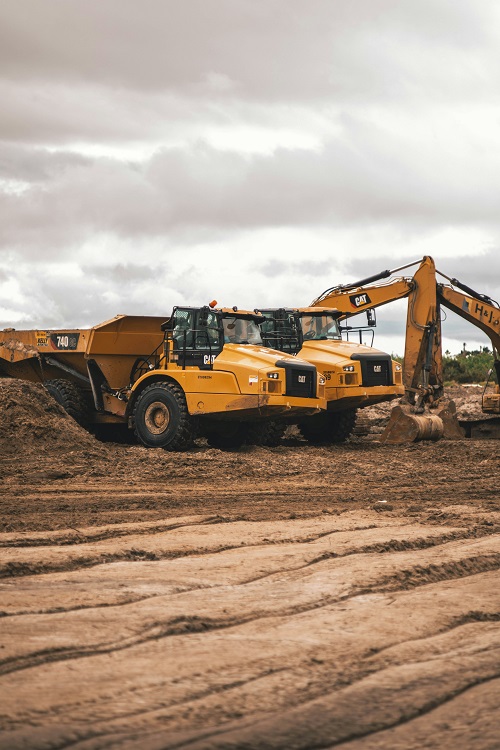Construction Equipment Leasing

Type: Equipment Leasing Services
Key Products/Services Offered: Lease of construction equipment such as excavators, bulldozers, cranes, loaders, and concrete mixers.
Technology Considerations: Utilization of equipment management software for tracking equipment availability, maintenance schedules, and lease agreements.
Market for the Products/Services: Targeting construction companies, contractors, and individuals involved in construction projects across various sectors in Kenya.
Construction Equipment Suppliers in Kenya:
- Mantrac Kenya:
Official dealer of Caterpillar equipment.
Located in Nairobi.
Provides a wide range of heavy machinery for construction sectors.
Offers high-standard services and support.
Address: Off. Lusaka road, Witu Road, Nairobi / Tel: +254(0)20 499 53 00 / Email: info@mantrackenya.co.ke - Ganatra Plant & Equipment Ltd:
Provides JCB products and machinery.
Offers both brand-new and used equipment.
Based in Nairobi.
Address: Baba Dogo Road, Ruaraka, Nairobi / Tel: +254 723 506 911 / +254 731 495 925 / Email: info@gpe.co.ke - Achelis Kenya:
Over 65 years of experience.
Located in Mombasa Road Nairobi.
Authorized dealer of CASE New Holland, ZOOMLION, BOMAG, and SCHWING-STETTER.
Also deals with medical & laboratory machinery and security equipment.
Address: Opposite Tuskys Head Office, Mombasa Road, Nairobi / Tel: +254 720 521635 / Email: akl@achelis-group.com - Panafrican Equipment Kenya:
Part of Panafrican Group headquartered in Dubai.
Supplies diverse construction machines including Komatsu, Wirtgen, and AGCO equipment.
Address: Uhuru Highway, Bunyala Roundabout Nairobi / Tel: +254 732 151 000 / Email: info.ke@panafricangroup.com - Car and General Kenya:
Represents reputable construction equipment manufacturers across East Africa.
Supplies Toyota forklifts, Kubota tractors, and Doosan Construction equipment.
Established in 1936.
Address: New Cargen House Lusaka Road Industrial Area / Tel: +254-722 209872 / Email: info@cargen.com.
Key Inputs into the Business:
- Procurement of construction equipment (new and/or used) from reputable suppliers or manufacturers.
- Business registration and legal requirements including licenses and permits.
- Establishment of a strategic business location near construction sites with convenient transportation access.
- Investment in comprehensive insurance coverage for equipment protection.
- Development of clear and comprehensive lease agreements outlining terms, rental rates, and maintenance responsibilities.
Product/Service Preparation Process:
- Conduct thorough market research on the construction industry in Kenya to understand demand and competitor analysis.
- Create a detailed business plan outlining goals, target market, pricing strategy, marketing plan, and financial projections.
- Obtain the necessary licenses and permits required for operating a leasing business.
- Choose a strategic location considering proximity to construction sites and transportation access.
- Establish relationships with reputable suppliers or manufacturers to source construction equipment meeting safety and regulatory standards.
- Develop comprehensive lease agreements covering terms, rates, and maintenance responsibilities.
- Implement a marketing strategy including industry events, networking, online platforms, and transparent pricing.
- Establish routine maintenance schedules and conduct regular inspections to ensure equipment quality and condition.
Quality Considerations:
- Ensure all leased equipment meets safety and regulatory standards.
- Implement routine maintenance schedules to upkeep equipment quality and performance.
Cost of Investment:
- Cost of construction equipment: This is one of the primary expenses and varies depending on factors such as the type, quality, and quantity needed to start the business. Estimate: Ksh 50,000 to Ksh 200,000.
- Business Licensing: Acquiring the necessary permits and licenses from local authorities to operate legally. This includes registration fees and annual renewal costs. Estimate: Ksh 6000 KSH 10,000.
- Transportation: Expenses related to transporting from suppliers to your business location or customers. This includes fuel costs, vehicle maintenance, and hiring drivers. Estimate: Ksh 20,000 to Ksh 50,000.
- Rent: Cost of leasing or renting a space for your business operations. The rent varies based on the location and size of the premises. Estimate: Ksh 30,000 to Ksh 100,000 per month.
- Miscellaneous Expenses: This includes costs for utilities (electricity, water), marketing materials, office supplies, and initial inventory. Estimate: Ksh 10,000 to Ksh 30,000.
- Contingency Fund: Setting aside a portion of the budget for unforeseen expenses or emergencies. Estimate: 10% to 20% of the total estimated costs.
Total estimated costs:
- Small-size business: Ksh 100,000 to Ksh 200,000.
- Medium-size business: Ksh 120,000 to Ksh 500,000
- Large-size business: Ksh 900,000 and above.
These estimates are approximate and may vary based on specific factors such as location, market conditions, and individual business preferences.
- Required Operational Infrastructure:
- Office space for administrative tasks and client meetings.
- Storage space for equipment when not in use.
- Access to transportation for equipment delivery and retrieval.
Most Suitable or Viable Location of the Business:
Proximity to construction sites and transportation hubs for convenient equipment access.
Potential Sources of Investment Capital:
- Personal savings, loans from financial institutions, and partnerships with investors.
- Requirements for Effective Management:
- Efficient equipment management systems, clear lease agreements, reliable suppliers, and effective marketing strategies.
Role of Mobile Phone and ICT in the Business:
- Utilize mobile phones for communication with clients and suppliers and potential use of equipment management software.
- Statutory Regulations and Licenses:
- Compliance with all legal requirements including business registration, licenses, and permits.
Pricing Strategy:
Set competitive and transparent pricing based on market research and industry standards.
Profitability:
Profit margins will vary based on equipment utilization rates, lease rates, and operational expenses.
Next Steps to Take:
Secure equipment procurement, finalize legal requirements, establish maintenance schedules, implement marketing strategies, and begin client acquisition efforts.

